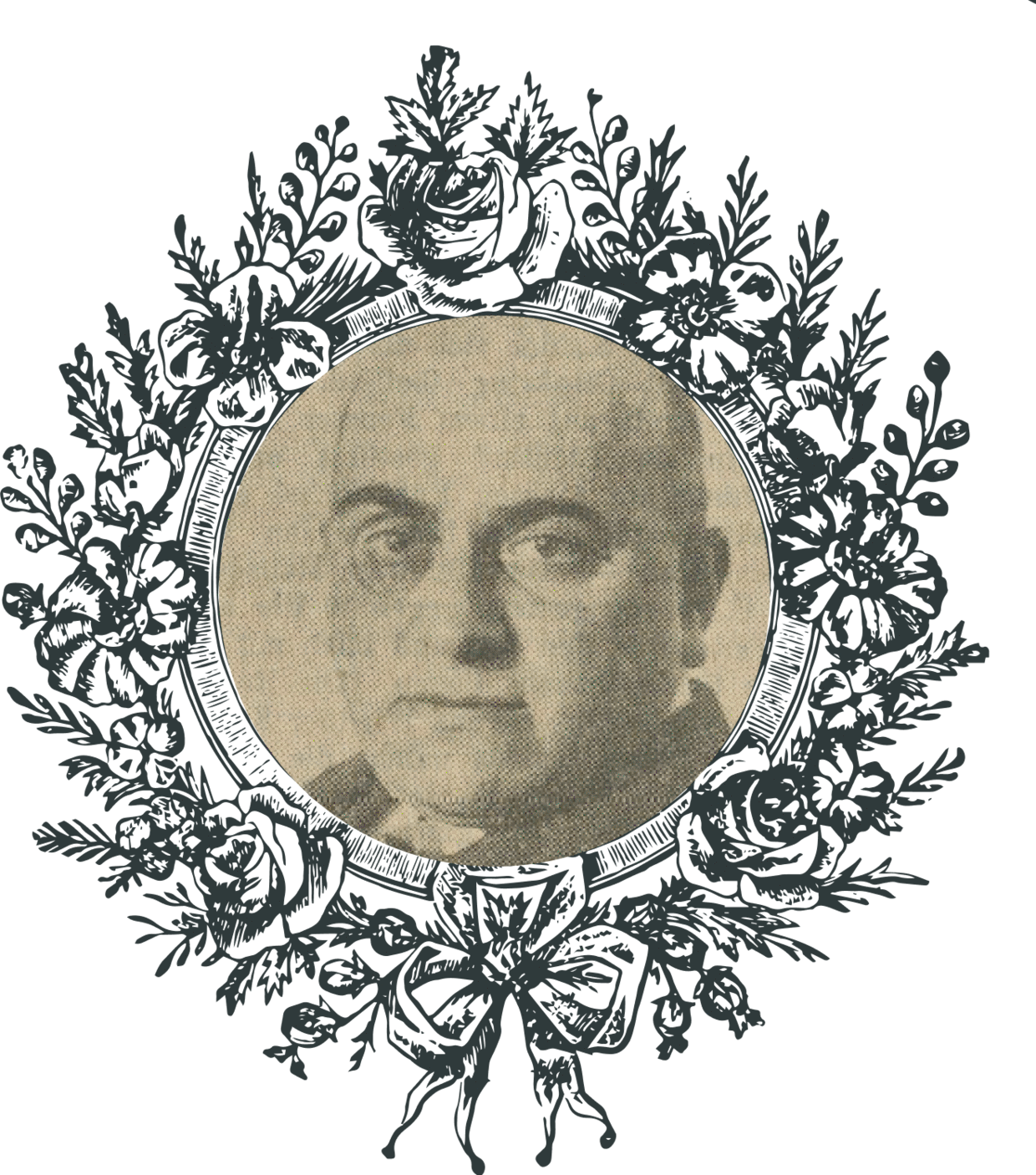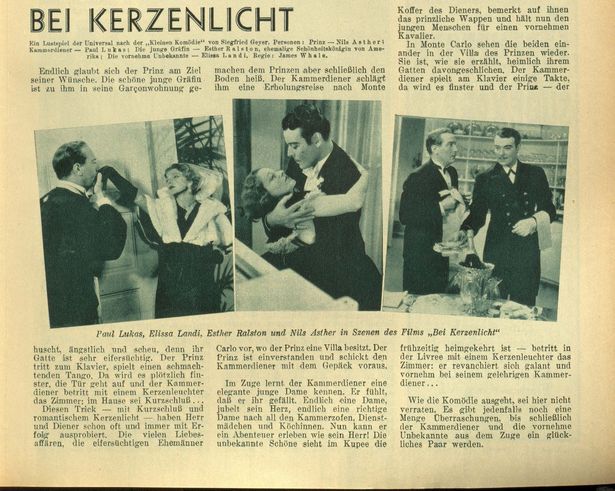Vienna, March 24, 1934
From the Stage to the Screen –
Siegfried Geyer Conquers Hollywood!
A film preview by Leo Plankensteiner

in Die Stunde, 2 Aug. 1925, p. 5
Source: ANNO/Austrian National Library
Illustration: © Eva Leitner
‘I am one of the kindest and most accommodating victims of the general economic crisis. Of the bad economy. Or of the Breitner [Hugo Breitner, social-democratic fiscal policy maker]. Or my inability.’
n
Siegfried Geyer
From the Viennese theatres to the great wide world of the talkies! The Lower Austrian native and adopted Viennese, Siegfried Geyer, achieves precisely this feat with the American adaptation of his comedy of mistaken identities, Bei Kerzenlicht, in Hollywood. However, Geyer’s path to that point was quite turbulent. While serving as the interim director of the Neue Wiener Bühne and the Modernes Theater, he displayed less skill than he would later as a writer.
Well, writing may have been easier for the former theatre critic than the financial handling of an entire theatrical house. After all, Geyer resigned from his position as stage manager of the Modernes Theater in 1925 after a financial settlement including court hearings. He attributed the financial difficulties and his move back behind the desk to the current economic crisis. The theatres, Geyer said, had given up on him before he’d gotten around to giving them up.
Fortunately, he has not left the theatre behind entirely. In addition to his return as a journalist for the newspaper Die Stunde, Siegfried Geyer did not miss the opportunity to work on new material.
After his financial faux pas as a director, he wrote a work that can certainly be called a box-office hit. His play Bei Kerzenlicht became a breathtaking story of success. What began at the Theater in der Josefstadt with the ever-popular actress Maria Paudler quickly made its way from London to New York and all the way to Hollywood, where another successful Austrian Hollywood export, of all people, is now playing the lead role: Elissa Landi. Other roles will feature Esther Ralston, Nils Asther, and Paul Lukas under the guidance of Frankenstein director James Whales.
Bei Kerzenlicht, however, is not Geyer's first play to be turned into a film. He has previously been responsible for the content of Der Rebell (‘The Rebel’) und Narr seines Herzens (‘The Fool of His Heart’). For his texts, he also likes to collaborate with renowned colleagues such as Paul Frank. The latest film was made together with actor and cabaret artist Karl Farkas.
g
The editorial team had the privilege of viewing the new film in advance and forming an impression of it. Naturally, the American adaptation deviates here and there from the original stage play, but the film is brimming with humour and delivers exactly what it promises! In this cheeky romantic comedy, truly no one is the person they claim to be. The Baron, portrayed as Prince Alfred in the film, and his servant Josef desperately try to imitate their idol Casanova and conquer the hearts of Vienna. In the process, things get a bit shaky when a lie or two slips out.
The international cast impresses with its acting brilliance and thus is not outshone by the numerous productions at the renowned theatres. The two bon vivants, Nils Asther and Paul Lukas, engage in a humorous rivalry for the fabulous actresses Elissa Landi and Esther Ralston, and they all enjoy being in the flickering candlelight. So, strike up the piano, turn off the lights, and let the candles shine!
The film comedy, produced by Universal, will be released in cinemas under the English title, By Candlelight. Here in Vienna, the film will be shown in the original English version with German subtitles. We are looking forward to seeing the charming prince and his valet and wish the film all the best before its theatrical release!

Siegfried Geyer
born 23 January 1883, Marchegg
died 1945, Hungary
Biography
Siegfried Geyer was born in Marchegg, Lower Austria, in 1883, the son of business owners under the family name Geyerhahn. While his brothers joined his parents’ business in the 3rd district in Vienna, Siegfried Geyer took a different path. His artistic career began at the age of 21, when he ventured to the Berliner Schauspielhaus as a young volunteer. After his time in Berlin, Geyer returned to Vienna, where he embarked on a diverse career marked by numerous highs and lows. Alongside his roles as a theatre critic and journalist, Siegfried Geyer ventured into collaborations with colleagues to create his own content for both theatre and film, thereby establishing his initial connections within the Austrian film industry.
Starting in 1920, he reduced his involvement in journalism and film and briefly explored opportunities as a director and dramaturge at different theatres in Vienna. However, due to financial difficulties, Geyer soon resigned from those positions and resumed his work on scripts for various comedies and comedic plays. His greatest success in this regard came with his farcical play Kleine Komödie (‘Little Comedy’), later known as Bei Kerzenlicht (‘By Candlelight’), which he co-wrote with Karl Farkas (1893–1971). The romantic comedy achieved significant success, not only in the world of cinema but also on national and international theatre stages. In addition to its productions at London’s Criterion Theatre and the Prince of Wales Theatre, By Candlelight was performed more than a hundred times on Broadway alone during the 1930s. The success story of this play began at the Theater in der Josefstadt. Subsequently, the material was swiftly adapted into a Kammerspielfilm (chamber-play film) in Hollywood. The leading role in the film was portrayed by Elissa Landi (1904–1948), an Austrian Hollywood celebrity who still has a star on the Walk of Fame in Los Angeles. The Deutsches Volkstheater in Vienna transformed Bei Kerzenlicht into an operetta and added a musical touch to the play. At the time, the magazine Der Wiener Film was already puzzling over whether another film adaptation would follow the play, the Kammerspielfilm, and the operetta. In fact, another film adaptation followed in America, as well as one in Germany in the late 1960s.
The author Siegfried Geyer did not live to see this success. After the Anschluss, the versatile Viennese director fled to Hungary, where he was brutally murdered shortly before the end of the war. Four years before he fled Vienna, his work was still being shown in Austrian cinemas. Later adaptations of this material also go by the names Casanova bei Kerzenlicht (‘Casanova by Candlelight’) or You Never Know. Today, his work is hardly known to anyone.

Source: ANNO/Austrian National Library

Source: ANNO/Austrian National Library
What remains?
k
Siegfried Geyer made a name for himself in Vienna through his diverse activities in the film and theatre industry. His career was varied, and was marked by many ups and downs. In times of failure, Siegfried Geyer demonstrated self-irony and humour. One of his directorial colleagues accused Geyer, after he left his position as a stage manager, of never being able to refuse anything simply for the sake of convenience. After all, the word ‘Ja’ (‘yes’) had two fewer letters than the word ‘Nein’ (‘no’).

Source: ANNO/Austrian National Library
Siegfried Geyer was an advocate of the theatre. He claimed not to believe in bad times, only in good actors and good plays. His play By Candlelight brought him international success and offered him the opportunity to try his luck overseas. However, Geyer initially decided to stay in Vienna. It was only when the situation became more and more precarious in 1938 that escape became inevitable for him. With the help of individuals from the Viennese publishing house Georg Marton, he successfully fled Austria for Hungary. Alongside Siegfried Geyer, the publishing house also aided other male authors like Paul Frank across the border.
However, after the Nazis finally took power in Hungary in March 1944, the situation changed once again. Much about Siegfried Geyer’s exact fate in Hungary is still unclear. The fact is that he was murdered by Nazis in Hungary in 1944 or 45. Today, there is nothing left in Theresianumgasse in the 4th district to remind us of his former inhabitant. His plays and films have also fallen increasingly into oblivion over time.
g


